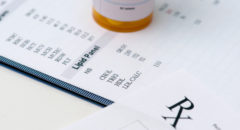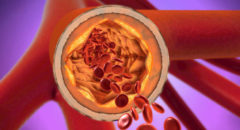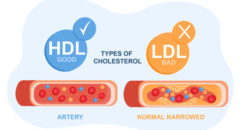
(BlackDoctor.org) — Ease the pain in your chest by paying
closer attention to your coronary arteries. According to research or other
evidence, the following self-care steps may help you prevent or repair
damage:
What You Need To Know:
- Understand the warning signs
Seek immediate medical
attention if you develop symptoms of new or worsening chest pain - Add L-carnitine to your daily routine
Take 1 gram of
this nutritional supplement two or three times a day to improve heart function
and ease symptoms of angina - Mix in some magnesium
Take 200 to 300 mg of this
mineral supplement twice a day to reduce the risk of exercise-induced chest pain - Get to know NAC
With a healthcare provider’s
supervision, take 600 mg of the supplement N-acetyl cysteine three times a day
to improve the effects of nitroglycerin - Make an appointment with an acupuncturist
Visit a
qualified practitioner to see if treatments reduce angina attacks and the need
for nitroglycerin, and improve exercise tolerance
These recommendations are not comprehensive and are not intended to replace
the advice of your doctor or pharmacist. Continue reading the full angina
article for more in-depth, fully-referenced information on medicines, vitamins,
herbs, and dietary and lifestyle changes that may be helpful.
Dietary changes that may be
helpful
Coffee should probably be avoided. Drinking five or
more cups of coffee per day has been shown to increase the risk of angina,
although effects of different forms of coffee on angina are unclear.
Lifestyle changes that may be
helpful
Cigarette smoking causes damage to the coronary
arteries and, in this way, can contribute to angina. It is critical for anyone
with angina who smokes to stop smoking. Smoking has also been shown to reduce
the effectiveness of treatments for angina. Secondhand smoke should be avoided
as well.
Increasing physical exercise has been clearly demonstrated to reduce symptoms
of angina, as well as to relieve its underlying causes. One study found that
intense exercise for ten minutes daily was as effective as beta-blocker drugs in
a group of patients with angina. Anyone with angina or any other heart
condition, as well as anyone over the age of 40, should consult a doctor before
beginning an exercise program.
Other therapies
Smoking is
discouraged, since nicotine prevents proper blood flow. In advanced stages,
surgical repair of the blood vessels in the heart may be recommended. Treatment
may be directed toward underlying medical conditions, such as high cholesterol,
high blood pressure, anemia, hyperthyroidism, obesity, or lung disease.
Vitamins that may be
helpful
L-carnitine is an amino acid needed
to transport fats into the mitochondria (the place in the cell where fats are
turned into energy). Adequate energy production is essential for normal heart
function. Several studies using 1 gram of L-carnitine two to three times per day
showed an improvement in heart function and a reduction in symptoms of angina.
Coenzyme Q10 also contributes to the energy-making mechanisms of the heart.
Angina patients given 150 mg of coenzyme Q10 each day have experienced greater
ability to exercise without experiencing chest pain. This has been confirmed in
independent investigations.
Low levels of antioxidant vitamins in the blood, particularly vitamin E, are
associated with greater rates of angina. This is true even when smoking and
other risk factors for angina are taken into account. Early short-term studies
using 300 IU (International Units) per day of vitamin E could not find a
beneficial action on angina. A later study supplementing small amounts of
vitamin E (50 IU per day) for longer periods of time showed a minor benefit in
people suffering angina. Those affected by variant angina have been found to
have the greatest deficiency of vitamin E compared with other angina
patients.
Nitroglycerin and similar drugs cause dilation of arteries
by interacting with nitric oxide, a potent stimulus for dilation. Nitric oxide
is made from arginine, a common amino acid. Blood cells in people with angina
are known to make insufficient nitric oxide, which may in part be due to
abnormalities of arginine metabolism. Taking 2 grams of arginine three times per
day for as little as three days has improved the ability of angina sufferers to
exercise. Seven of ten people with severe angina improved dramatically after
taking 9 grams of arginine per day for three months in an uncontrolled study.
Detailed studies have investigated the mechanism of arginine and have proven it
operates by stimulating blood vessel dilation.
NAC (N-acetyl cysteine) may improve the effects of
nitroglycerin in people with angina. People with unstable angina who took 600 mg
of NAC three times daily in combination with a nitroglycerin transdermal (skin)
patch for four months had significantly lower rates of subsequent heart attacks
than did people who used either therapy alone or placebo.
Magnesium deficiency may be a contributing factor for spasms
that occur in coronary arteries, particularly in variant angina. While studies
have used injected magnesium to stop such attacks effectively, it is unclear
whether oral magnesium would be effective in preventing or treating blood vessel
spasms. One double-blind study of patients with exercise-induced angina,
however, showed that oral magnesium supplementation (365 mg twice a day) for 6
months significantly reduced the incidence of exercise-induced chest pain,
compared with a placebo.
In a controlled study, men with severe coronary heart disease were given an
exercise test, after which they took either 15 grams of ribose or a placebo four
times daily for three days. Compared with the initial test, men taking ribose
were able to exercise significantly longer before experiencing chest pain and
before abnormalities appeared on their electrocardiogram (ECG), but only the ECG
changes were significantly improved compared with those in the placebo group.
Sports supplement manufacturers recommend 1 to 10 grams per day of ribose, while
heart disease patients and people with rare enzyme deficiencies have been given
up to 60 grams per day.
Bromelain has been reported in a preliminary study to
relieve angina. In that study, 600 people with cancer were receiving bromelain
(400 to 1,000 mg per day). Fourteen of those individuals had been suffering from
angina. In all 14 cases, the angina disappeared within 4 to 90 days after
starting bromelain. However, as there was no control group in the study, the
possibility of a placebo effect cannot be ruled out. Bromelain is known to
prevent excessive stickiness of blood platelets, which is believed to be one of
the triggering factors for angina.
Fish oil, which contains the fatty acids known as EPA and
DHA, has been studied in the treatment of angina. In some studies, enough fish
oil to provide a total of about 3 grams of EPA and 2 grams of DHA has reduced
chest pain as well as the need for nitroglycerin; other investigators could not
confirm these findings. People who take fish oil may also need to take vitamin E
to protect the oil from undergoing potentially damaging oxidation in the body.
It is not known how much vitamin E is needed to prevent such oxidation; the
amount required would presumably depend on the amount of fish oil used








